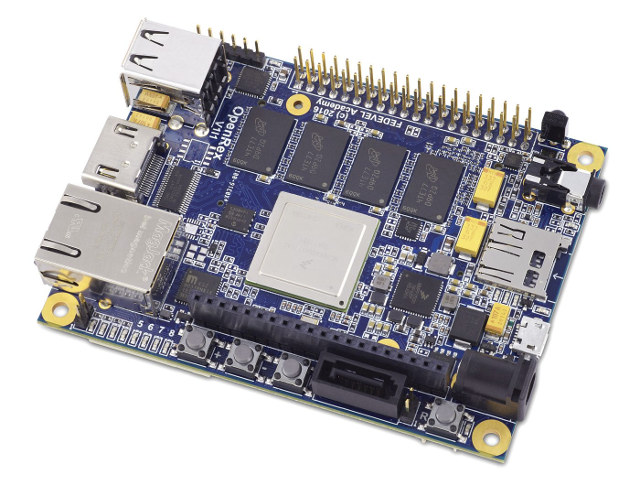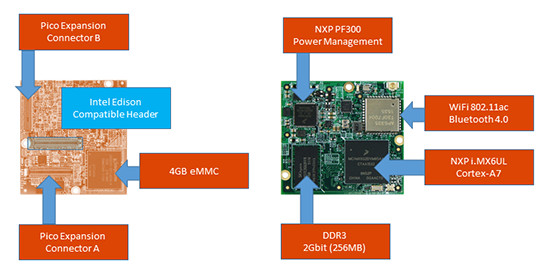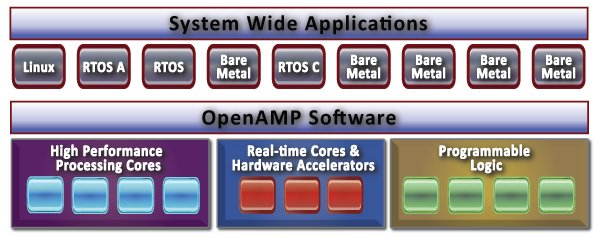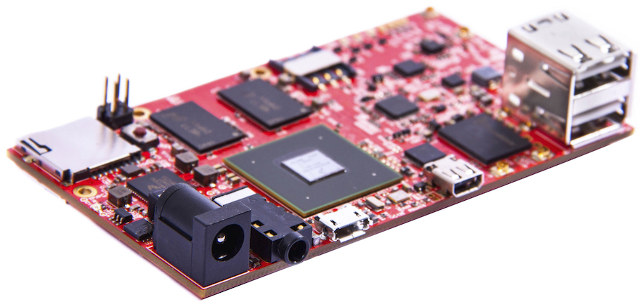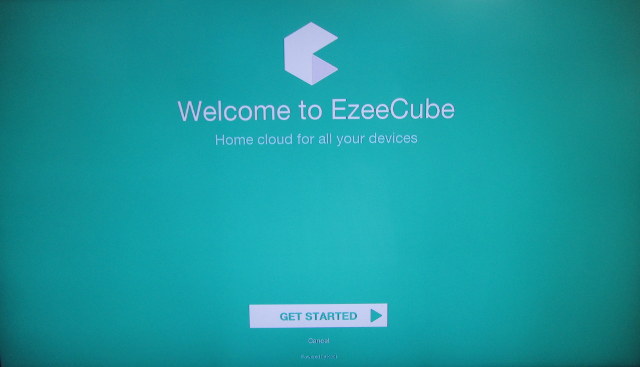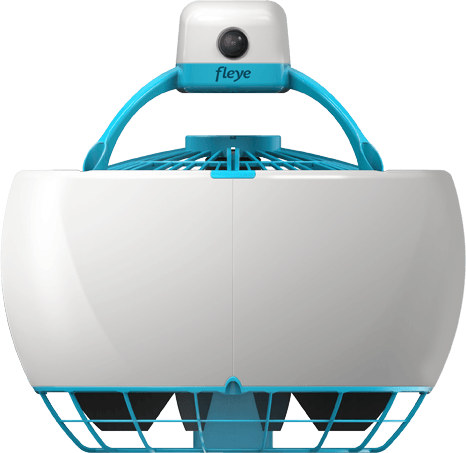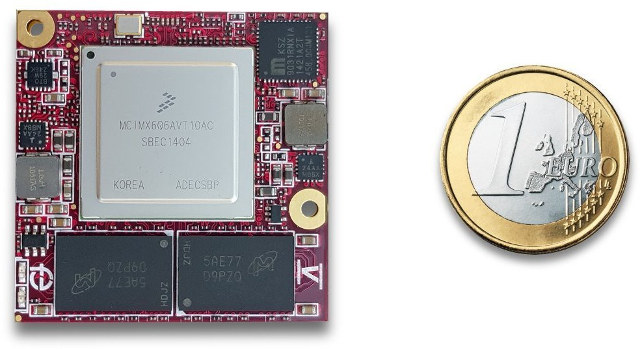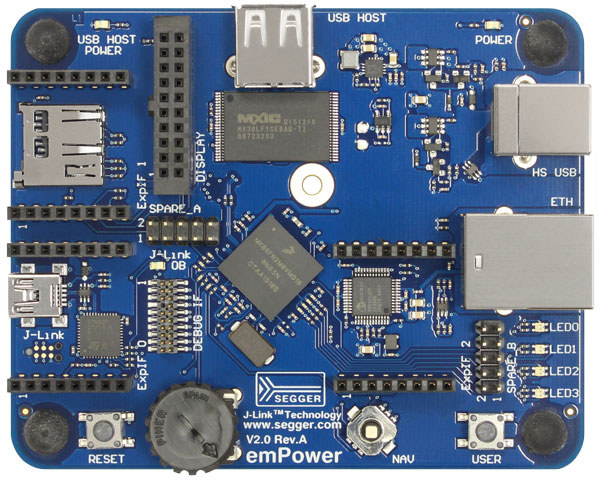OpenRex is an open source hardware board powered by NXP i.MX6 designed by Fedevel, and the company has announced the release of Altium project design files including both schematics and PCB layout source files, as well as manufacturing documentation. OpenRex board specifications: SoC – NXP i.MX6 processor @ up to 4 cores @ 1.2GHz with 2D and 3D GPU MCU – NXP LPC1345FHN33 ARM Cortex-M3 micro-controller System Memory – DDR3-1066 (533MHz) up to 4GB Storage – SATA, micro SD slot, 1x I2C EEPROM, 1x SPI FLASH Video Output / Display I/F – 1x HDMI up to 2048×1536 resolution, LVDS, parallel RGB display output, touchscreen connector (Optional 4x Analog input) Audio – HDMI output, 3.5mm stereo headphone jack, Camera – 1x Parallel CSI camera (shared with RGB output), 1x MIPI CSI connector compatible with Raspberry Pi (shared with LVDS) Connectivity – 1x 10/100/1000 Mbps Ethernet USB – 2x USB 2.0 host […]
Wandboard Introduces $69 Hobbitboard Made for Brillo Powered by NXP i.MX6 UltraLite Processor
Wandboard was one of the first to launch boards based on Freescale i.MX6 Solo, Dual and Quad in early 2013. The boards are comprise of an EDM system-on-module and a carrierboard, that makes it not only suitable as a single board computer, but you could also use the boards to start developing software, while making your own carrierboard to match your application. Wandboard.org community sent me an email last night to let me know about their latest board called Hobbitboard, or in full “Hobbitboard Made for Brillo”, powered by NXP i.MX6 UltraLite Cortex A7 processor, which follows the same principle, and includes Hobbit Compute Module and Hobbit I/O Carrierboard. Hobbit Compute Module specifications: SoC – NXP i.MX6 UltraLite Cortex A7 processor @ 528 MHz System Memory – 256MB DDR3 Storage – 4GB eMMC flash Connectivity – 802.11ac WiFi and Bluetooth 4.0 (Ampak AP6335) Board Connectors – Two Pico Expansion header […]
OpenAMP Open Source Framework Provides the Glue between Linux, RTOS, and Bare Metal Apps in Heterogeneous SoCs
SoCs becoming more complex, and go beyond homogeneous multicore systems by mixing different type of cores such as high performance cores, low power real-time cores, or even FPGA fabric. Examples include NXP i.MX6 SoloX with an ARM Cortex A9 core for Linux apps, and an ARM Cortex M4 core for real-time tasks, or Xilinx Zynq UltraScale+ MPSoC with Cortex A53 core for higher level apps, Cortex R5 cores for real-time processing, and Ultrascale FPGA logic. All these different cores are running their own Linux based OS, real-time operating system or bare metal application, and all this makes software development an even greater difficult tasks. In order to reduce the complexity, and address some of the issues, the Multicore Association has launched a new working group targeting the management, expansion, and standardization of OpenAMP (Open Asymmetric Multi Processing), an open source framework that allows operating systems to interact within a broad […]
PixiePro Board Combines NXP i.MX6Q Processor with WiFi 802.11ac, Bluetooth 4.2, NFC, GPS, and a 3G Modem
Saying that the market now provides a wide range of development boards is probably an understatement, but Code Ing has found out that most hobbyist boards had limited on-board wireless connectivity with WiFi and Bluetooth basically the best you could expect, with any extra wireless functionality requiring USB dongles. So the company designed PixiePro single board computer powered by NXP i.MX6Q quad core Cortex A9 processor with on-board wireless connectivity including WiFi 802.11ac, Bluetooth 4.2, GPS/GLONASS, NFC and a 3G module. PixiePro board specifications: SoC – NXP i.MX6Q quad core Cortex A9 processor @ 1 GHz with Vivante 2D and 3D GPUs System Memory – 2GB 64-bit DDR3 Storage – 2x UHS-I micro SD card slot up to 104 MB/s Video Output – micro HDMI up to 1080p60 Audio Output – HDMI and 3.5mm mini TOSLINK optical port/Line Out Connectivity WiFi 802.11 a/b/g/n/ac 2×2 MIMO with two antenna connectors Bluetooth […]
Review of EzeeCube Media Hub and Private Cloud Server
EzeeCube is a Linux Kodi based media hub powered by Freescale i.MX6 Quad processor that includes a 1 or 2 TB hard drive by default and is expandable with extra 2TB hard drive modules that you simply stack on top of each other to get up to 10TB storage. I had a look at EzeeCube hardware last October, but due to one issue with the Android app that prevents syncing pictures between my phone and the hard drive on the device, one of the key selling point of the system, I decided to postpone the review. EzeeCube developers finally found a workaround in early December, but as I was busy with other tasks and the end of year holidays, I only managed to finally review the device in the last few days. Initial Setup The first thing that you go through after connecting all cables, and powering up the media […]
Fleye is a Safe, Robust and Developer Friendly Drone Powered by NXP i.MX6 Processor (Crowdfunding)
In most cases, it’s a pretty bad idea to touch a drone while it’s flying, as you could potentially hurt yourself and others with the blades, so a startup based in Belgium has decided to design a safe drone with the blades hidden under a shell surrounded by protective grids, and with features such as obstacles avoidance. The design also makes the drone sturdier, and less prone to breakage should it fall or hit obstacles. The drone, dubbed Fleye, is based on NXP i.MX6 dual core processor, runs a Linux OS built with the Yocto Project, and the company also plans to provide APIs, and mobile SDKs to allow the developer community to experiment with the drone, and/or create mobile apps. Main hardware features of Fleye drone: SoC – Freescale NXP i.MX6 dual or quad core ARM Cortex A9 processor @ 800 MHz with Vivante GPU System Memory – 512 […]
iMX6 TinyRex Module and Development Board Support HDMI Input in Linux (Video Demo)
A couple of years ago, I wrote about iMX6 Rex open source hardware project combining a Freescale i.MX6 SoM and baseboard that aimed a teaching hardware design (schematics and PCB layout). I had not followed the project very closely since then, until I watched a video showcasing HDMI input capabilities in Linux using the new version of the module and baseboard called i.MX6 TinyRex. i.MX6 Tiny Rex module specifications: SoC – Freescale iMX6 processor up to 1.2GHz and 4 cores System Memory – Up to 4GB DDR3-1066 (533MHz) Storage – EEPROM Connectivity – 10/100/1000 Mbps Ethernet PHY I/Os via 3 board to board connectors: Display / Video Output 1x HDMI (up to QXGA 2048×1536) 1x LVDS (up to WUXGA 1920×1200) 1x 20-bit parallel LCD display (up to WXGA 1366×768) or 1x Video Input (CSI) 1x MIPI DSI differential display output (up to XVGA 1024×768) Video Input 1x 20-bit parallel video input […]
Segger emPower is an embOS RTOS Evaluation Board with a J-Link OB Debug Interface
Segger, a company specializing in embedded software and hardware debugging tools, has recently launched Segger emPower, an evaluation board powered by Freescale Kinetis K66 Cortex M-4 MCU and including a J-LInk OB debug probe (JTAG/SWD), specially designed to evaluate the company’s embOS real-time operating system. emPower board hardware specifications: MCU – Freescale Kinetis K66 (MK66FN2M0VMD18) ARM Cortex M4F MCU @ 180MHz with with 256KB SRAM and 2MB flash memory Storage – 1Gbit NAND Flash + micro SD card connector Display I/F – 20-pin display adapter connector (5 V/3.3 V, SPI, PWM for backlight control) for small TFT displays Connectivity – Fast Ethernet USB – 1x USB device, 1x USB host (Full speed) Debugging On-board debug probe J-Link-OB with drag & drop (STM32F072, mini A/B-type connector); SWD/SWO only, no CDC/VCOM port support External debug interface (19-pin Cortex-M) including trace Expansion 3x Sensor Expansion Interface Devices (SExI) headers providing I2C, SPI buses, […]

